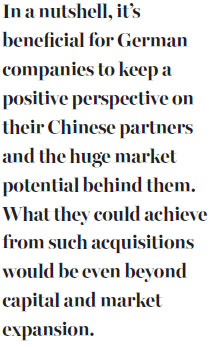This acquisition spree is no cause for worry
Updated: 2016-11-11 07:36
By Biao Ding(China Daily Europe)
|
|||||||||
Although it's tempting for media to use sensational headlines such as "China's buying spree spooks Germany", such concerns are ill-founded, based on my own experience in Europe. The acquisitions were all win-win by nature and collaboration driven, not mere matter of resource capture.
Among Sino-German mergers and acquisitions, high-tech and manufacturing are the two most active sectors, according to China's Ministry of Commerce.
Take high-end equipment manufacturing, for example. Most of the small and-medium-sized players in Germany are family owned - time-honored for decades or even centuries. They are successful, but operating mainly in Europe, with few orders beyond the continent.
Germany, a crucial market in Europe, is open to fierce competition. Small players face not only domestic counterparts but also bigger ones from Japan, the United States and Eastern Europe. Yet because of limited profits, it is impractical to rely solely on a company's capital to enhance investment, explore new markets, improve designs and launch new products.

Therefore, tapping into sustainable support from bigger companies is a way of surviving and thriving in the face of competition. In 2011, German manufacturers saw a general slide in orders due to the economic slowdown and shrinking demand.
Earlier, in July this year, government statistics showed 1,805 German companies filed for bankruptcy.
Some liquidity-stressed ones only survived after takeover and subsequent capital injection.
Chinese acquirers in the high-end manufacturing industry are likely to have a strong foothold at home and may even dominate the market. After two decades of fast growth in China, they are transforming from the traditional export-driven model to operate in an international sphere.
With remarkable global vision and abundant resources, those firms tend to acquire smaller players in Germany to achieve goals including technology upgrades, strategic synergy and industrial transformation.
Chinese companies value the professional management team and technicians their German counterparts can offer to help them achieve their targets. Routinely, they retain the existing management team after acquisition, while making only a few changes at the strategic level. The Chinese shareholders would by no means be a constraint on the acquired companies. On the contrary, they support them fiscally as well as in market expansion.
Chinese companies are looking strategically for global markets and continuous innovation. It is without doubt they will ensure a sustainable development of their acquired targets. In the acquisition case I worked on, the first thing we told our German employees is that we aimed to help the company grow further.
In Germany, even the big players are faced with fierce competition. As I was writing this column, Midea's recent takeover of German robot maker Kuka drew my attention.
Kuka reported sales revenue of 2.1 billion euros ($2.3 billion; 1.86 billion) in 2014, out of which 141.8 million euros, or 6.8 percent, was earnings before tax.

Last year, the company saw its profit margin drop to 4.6 percent, as it reported 135.6 million euros in earnings before tax out of 2.97 billion euros in revenue.
A pre-tax margin of 5 to 7 percent is already impressive in Germany's industrial and engineering sector. However, price competition remains very tense in Kuka's automation field.
Although Kuka didn't specify segment-based costs, we can still sense the cutthroat competition. The company also stresses how crucial research and development is in retaining its technological edge.
Last year, Kuka spent about 105 million euros in R&D, accounting for 3.5 percent of its sales revenue. Its R&D budget for this year is 120 million euros, mainly for Industrial 4.0 related robotics.
Over the past two years, China assembled roughly one-third of the world's robots. Besides the country's huge market potential, manufacturing costs will also be lower after the acquisition.
According to a Bloomberg report in July, Midea has already used 100 Kuka robots in its factories. The company aims to lower its workforce by one-fifth, from the current 100,000 to 80,000. Upon completion, the acquisition will be a benchmark for Sino-German strategic synergy.
In a nutshell, it's beneficial for German companies to keep a positive perspective on their Chinese partners and the huge market potential behind them. What they could achieve from such acquisitions would be even beyond capital and market expansion.
The author is general manager of CRRC UK Limited.
The views do not necessarily reflect those of China Daily.
( China Daily European Weekly 11/11/2016 page12)
Today's Top News
Alibaba Singles Day sales hit 10b yuan in 7 minutes
Obama, Trump meet at White House
Xi congratulates victor Trump
Polls missed support for Trump
Superstars party with Jack Ma before shopping spree
Europe would elect Clinton: Poll
UK 'will stick to planned EU departure plan'
UK PM May promises EU exit 'in full'
Hot Topics
Lunar probe , China growth forecasts, Emission rules get tougher, China seen through 'colored lens', International board,
Editor's Picks

|

|

|

|

|

|







